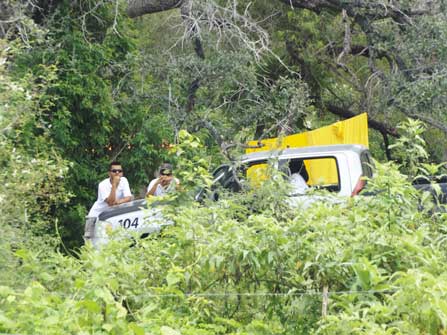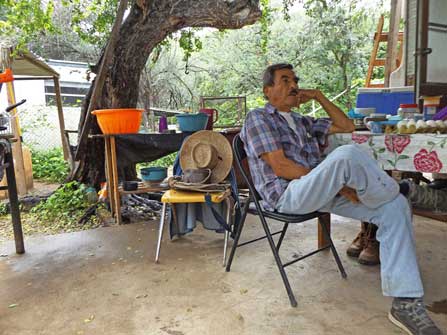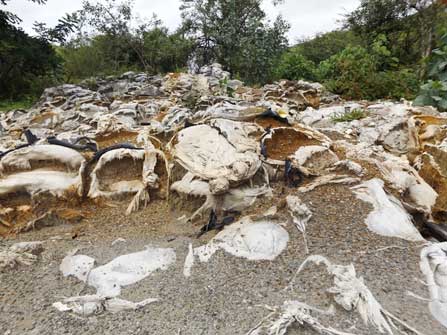Los Cardones Mine divides comunity;
former City Council faces imprisonment

Employees from the private security company surround Rancho Padercitas and monitor traffic in and out.
LAS PADERCITAS
On March 4th, 2015 this cattle ranch, located within the Sierra la Laguna Biosphere Reserve, was victim to a violent attack. Thirty people of unknown origin evicted, under threat of death, everyone they found on the ranch, demolished a house, and stole a number of valuable items. They knocked down corrals and the ranch’s cattle have wandered off.
Jorge Ricardo Cordero, the 74 year old owner of the property, states that since then the members of his family have continued to be accosted by private security guards who have set up a camper on the ranch. Additionally, starting from the community of El Rosario, just a few kilometers from the ranch, Private Security S. de R.L. de C.V. has set up two guard posts that monitor traffic in and out, and also has employees surrounding the property.
Cordero asks: "what is it that they are guarding and why"?
According to his son Cristián Cordero, not only have they attacked the family but also the environment because these employees are defecating openly on the land, contaminating the biosphere reserve, and destroying vegetation.
The family has reported these actions to the authorities.
"We have gone to both the Public Prosecutor and the Office of Human Rights, but there has been no response from either. They have done nothing; we don't have authorities here. The Assistant District Attorney told us that they can do nothing until someone is killed", Cordero recounts.

Jorge Ricardo Cordero, 74 and property owner of the ranch adjacent to the mining project, discusses how his family members have been acosted.
The Corderos have had conflicts for some time with the Los Cardones mining project, run by Desarrollo Zapal S.A. de C.V.. In order to begin the work, the company needs 1,000 hectares of the 2,500 the family owns, according to Cordero.
The company tried to purchase the land but the family refused because they have lived on the property for more than 73 years.
Then, Cordero adds that the company, which owns the adjacent Ejido Jesús María, incorrectly measured the property lines in order to appropriate the land.
These actions provoked a complaint against the project, initiated by the Mesoamerican Movement Against the Extractive Mining Model, M4.
In Cordero's opinion, "if the company begins work, everything will be even worse."
Those in charge at both the security and mining companies did not respond to various attempts by Melóncoyote for comments.
Mexican civil society has taken great interest in the attacks after the lack of response from the authorities. The Citizen's Water and Life Defense Front, formed by 37 organizations like CEMDA, Niparajá, MAS, Conciencia, and others has helped to collect food and funds, repair damages incurred on March 4th, and provide legal support.
They have also organized town halls and conferences to increase awareness of the issue. In one of these they compared the mine that once existed in Los Planes, also in Baja California Sur with the one that would be developed on the Cordero family’s property.
"Los Planes has wells with up to 800 mg of arsenic when both the World Health Organization and National Academy of Science permit just 3 mg,” they note.
"This is a mine that had minimal activity, and all that it produced in its entire lifetime, this project would produce in just10 days", emphasized Juan Ángel Trasviña, member of the Citizen's Front and a UNAM chemical engineer, in his invitation to Baja California Sur citizens to help in the defense effort.
In spite of having support from cities and towns across the state, the Corderos don't have support from the ranch's closest communities.
"They don't even stop by here, they don't talk to me or even say hello. Many deny knowing where the ranch is, others say it doesn't exist, and some will even give visitors the wrong directions so that they end up getting lost,” Cordero remarks.
According to the company's project and published by Semarnat on its website, the mine dates back to the 1970s.
Cordero recalls this and says, "between 1984 and 1987 they rented the land. Engineers came to take samples and brought drills from the United States and they clear cut the trees. There were spills and the water ran off into the arroyo. They are well aware of what they are doing."
Today you can still find bags of dirt that speak to past activities on the mountain.
Experts affirm that the Los Cardones silver and gold extraction project brings with it irreversible damage such as: deforestation, extinction of endemic species, contamination of aquifers, and greenhouse gas emissions.
It was said recently that the change in zoning was approved in a secret government session where those in attendance included head Councilman Fausto René Álvarez Gámez representing the mayor, and union members Francisco Javier Moreno Soria, Silvia García González, José Guadalupe Iñiguez Cabada, Norma Alicia Castañeda, Ricardo Fiol Higuera, Javier Martínez González, José de la Toba Camacho, Alma Melissa Bernal Araiza, Javier González Rubio Cerecer, Saúl Lamas Guzmán, and José Francisco Rubio Salgado.
Former municipal president Francisco Monroy Sánchez insisted that the Los Cardones project was not approved in its entirety because Desarrollo Zapal still has not proven ownership of the land.
On September 29th the La Paz city council resolved that the secret session held by former city council members, where they supposedly approved the zoning changes for Los Cardones, did not meet valid, legal requirements. They will go forward with criminal charges and impeachment proceedings against them.

